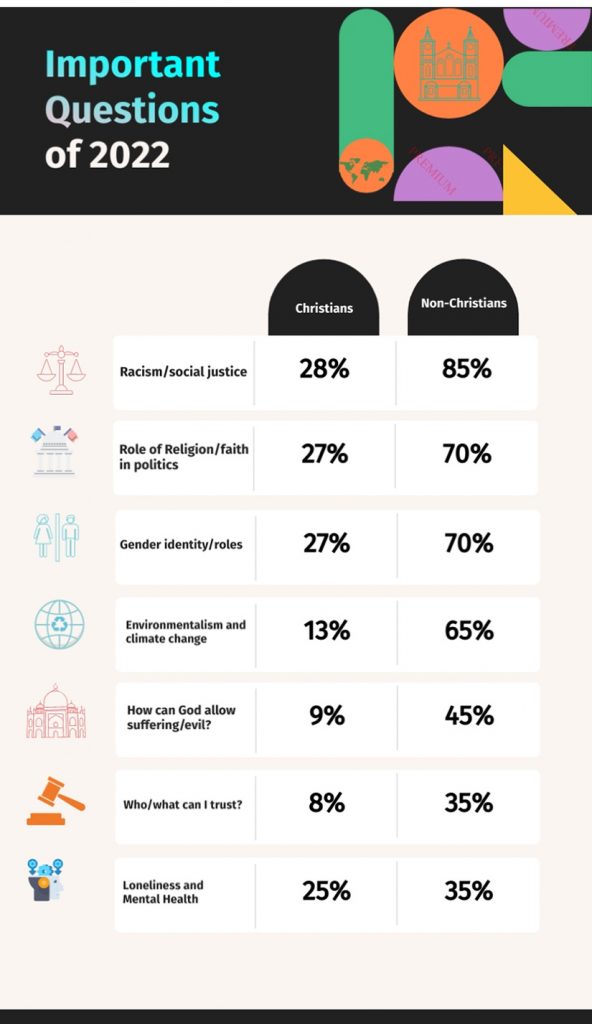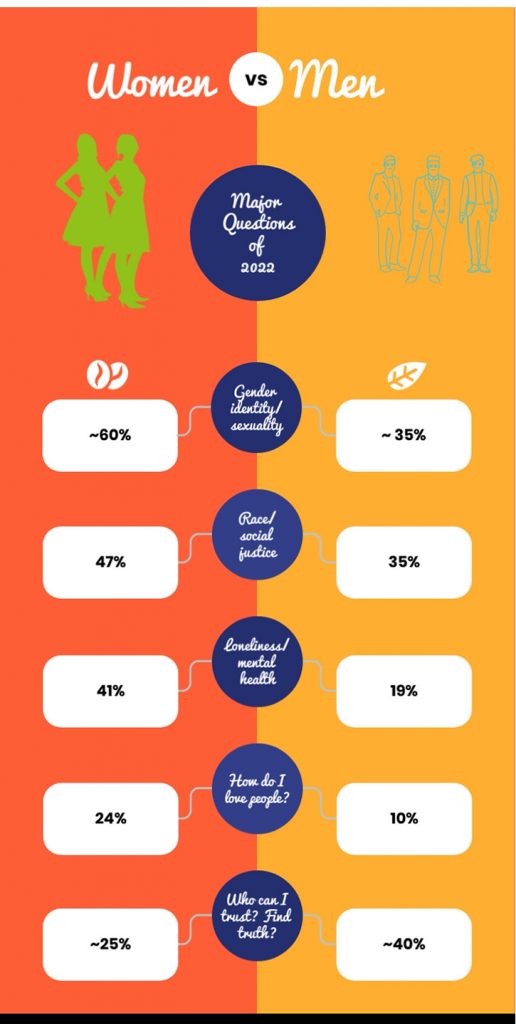A Post-COVID-19 Survey of the People in One Community
Editor’s Note: Our annual church survey, published in our May/June print/digital issue, provides a good one-year snapshot of our churches. What it cannot do is help church leaders understand the issues and questions being asked by people in our churches and communities.
Last year, one church conducted their own survey to help them (especially in the wake of COVID-19) better serve their church and community and more effectively make disciples.
Of course, every church exists within its own context and culture. If your church were to conduct a similar survey, your results would undoubtedly look different.
Christian Standard is providing this church’s survey and results to show leaders one way to discover the issues and questions of the people God has entrusted to you. This example may provide you with ideas for doing such a survey in your church.
_ _ _
By Timothy Jang
The COVID-19 pandemic changed the way people think about church and faith. Our elders at Risen Church Westside—a nondenominational Christian church in Santa Monica, Calif.—were challenged to make decisions that addressed the present reality of post-COVID-19 life and the future hope of God’s promises. To better serve our congregation and community, we decided to conduct a survey to understand the questions and issues being asked and considered by our members, local Christians, and non-Christians in the community.
THE SURVEY
Risen Church Westside is led by an elder board of seven men, two pastors (also elders), and two staff members. Prior to COVID-19, the church had 155 members and an average weekly attendance of 193 people; today, we have 104 members and an average weekly in-person attendance of 93 people, with another 25 real-time livestream participants.
Our survey sampled from three groups:
• Group 1 consisted of “members” of the church, including those who had recently relocated.
• Group 2 included “nonmembers,” self-identified Christians who have attended our congregation (including those who left the church for reasons other than relocation) and a few who worked with church leaders at other congregations.
• Group 3 was composed of “non-Christians” who work or volunteer at a local hospital where one of the pastors serves regularly. (This group was chosen due to ease of recruitment and because we believed they might be most impacted by the psycho-social-spiritual stresses of the COVID-19 pandemic.)
The electronic survey asked, “What do you think are the 21st-century questions or issues people are asking today?”
A total of 96 people participated in this survey: 44 members, 32 nonmembers, and 20 non-Christians. Of the respondents, 58 percent were White, 20 percent were Asian-American/Pacific Islander, 13 percent were Hispanic/Latin, 7 percent were Black, and 2 percent were Middle Eastern. We looked at the data by belief/member status, gender, and ethnicity.
THE RESULTS
We found a significant disconnect between Christians and non-Christians in our sample (see Figure 1). The non-Christians seemed to focus much more on issues that are prevalent in “headline news,” social media, and the larger, secular world. The non-Christians were 5 times more likely than Christians to identify environmentalism/climate change (65 percent vs. 13 percent) and question how God could allow suffering or punish people in Hell (45 percent vs. 9 percent) as “21st-century questions or issues people are asking today”; they also were 3 times more likely to identify race/social justice (85 percent vs 28 percent) and the meaning/purpose of life (30 percent vs. 10 percent); and 2.5 times more likely to identify the role of religion/faith in politics (70 percent vs. 27 percent) and gender identity/sexuality (70 percent vs. 27 percent). A significant proportion of non-Christians identified questions regarding who or what sources they could trust for information (35 percent) and some had questions about where they could find truth and whether or not they could trust the Bible (15 percent), compared to 8 percent and 20 percent, respectively, of the Christians in our sample.

An even greater disconnect was found between our members and the nonmember Christians in our community. Our church’s members, when compared to nonmember Christians, were 50 percent less likely to identify race/social justice, the role of religion/faith in politics and evangelism, and 67 percent less likely to identify environmentalism/climate change as “21st-century questions or issues people are asking today.”
Third, despite the disconnect between Christians and non-Christians, they shared common concerns about loneliness and mental health (25 percent and 35 percent, respectively), how to manage technology and social media (15 percent and 20 percent, respectively), and parenting challenges (7 percent and 10 percent, respectively). Furthermore, 18 percent of Christians raised questions regarding how to love people who are different from them and 12 percent raised questions about dealing with individualism in an increasingly collectivist society, while 15 percent of non-Christians raised concerns about how to deal with social divides.
Fourth, non-White respondents were 2.5 times more likely than White respondents to identify race/social justice as a major question people are asking today. Aside from that, however, there was little difference in responses based on ethnicity.
Fifth, there was a significant difference in responses between men and women (see Figure 2; this was consistent with prior research by Barna, Pew, et al.). Women were more than twice as likely to identify gender identity/sexuality, loneliness/mental health, and how to love people and 50 percent more likely to identify race/social justice as important issues today, but 50 percent less likely to have questions about sources of truth or trustworthy sources of information.

Sixth, there was general apathy regarding evangelism. Less than 10 percent of the Christians in our sample identified evangelism as an important question or concern people have today, and only 4 percent of our members identified evangelism as important. Although declining interest in evangelism has been noted in other studies and reports, we did not expect it to be so low.
Finally, our survey sample reflected a more cohesive sense of what people are asking among non-Christians than among Christians. (One possible explanation: the non-Christians in our sample all work or volunteer at the same place.) More than 50 percent of the non-Christians surveyed expressed strong interest in questions regarding race/social justice, the role of religion/faith in politics, gender identity/sexuality, and environmentalism/climate change. On the flip side, no single question was identified by more than 35 percent of the Christians in our sample. (Might these results suggest that a common workplace has a stronger cultural influence on those individuals than the church has on local Christians?)
Among the Christians in our sample, race/social justice and gender identity/sexuality were identified as “21st-century questions or issues people are asking today” by just under 30 percent of the respondents. These were followed by how we love others or people not like us (18 percent); how to balance faith and individual freedom (11 percent); how to live faithfully for God (11 percent); why Jesus is the only way/the exclusivity of Christianity (9 percent); and evangelism (8 percent).
This was true even of our members who have a shared worship experience, teaching, and participation in community groups.
OUR RESPONSE
As Christians, we believe our response ought to follow a time of prayer, seeking the Spirit, and studying Scripture. With that in mind, several things stand out initially.
The first pastoral application is contextualization. Contextualization is the process of giving biblical answers to the questions being asked by the people you are trying to reach. For the gospel to effectively transform a community, the church must address the questions people are asking now in their cultural contexts. If we have learned anything from the study, it is that the kinds of questions people in our congregation are asking are not what we had assumed, and their questions are even different from their neighbors. As a church, we are responsible for addressing the issues and obstacles people have regarding the Christian faith.
The second pastoral implication is the need to preach the whole counsel of God’s Word. In the same way that contextualization meets people where they are, we must also ensure that our people learn to ask better questions, and that they don’t just settle for the questions culture provides to them. When we teach the entire Bible, we are not simply reacting to the day’s issues. Still, we need to be proactive in creating and shaping people so they are prepared for the challenges ahead. Preaching all of God’s Word means we’re not just downstream of culture preparing our people to think Christianly at the moment, but we are using God’s Word to get upstream of culture, ensuring our people are ready for future questions they will face.
The third pastoral implication is the need to rethink how we approach discipleship. Fewer than 40 percent of our church’s members identified any one issue as a major concern today even though, over the past three years, we addressed gender identity/sexuality, the role of religion/faith in politics, and race/social justice several times through sermons, seminars, Sunday school classes, and in other ways. We dedicated pastoral and church resources to these issues, but most of our members did not identify them as important or significant. When we added in the responses from other Christians in our community, those numbers did not rise. A national study suggests that many people are spending more time on social media than studying God’s Word or attending church, and thus, social media may be doing more to shape people—including Christians—than the church.
The fourth pastoral implication is the need to reconsider how we approach Christian education in terms of community groups, Sunday school, and preaching. We have tried to take a “balanced” approach to preaching; at our church, preaching is primarily textually based with series through books or sections of the Old Testament and New Testament, punctuated by short topical series addressing issues of spiritual concern (such as spiritual disciplines, meaningful membership, etc.).
The fifth pastoral implication is our need to be clear about what we think our relationship should be with the community around us. The congregation must be aware of the community’s questions and concerns, and this knowledge should shape the preaching and ministry of the church. We have never preached on the biblical approach to environmentalism/climate change. We don’t have a unified view of how the gospel impacts these concerns. And while we have addressed gender identity/sexuality, the role of religion/faith in politics, and race/social justice in several different ways, we often did so in a purposefully apolitical and non-ideological manner. This approach was considered by some as too conceptual, and thus, too hard to put into practice.
The sixth pastoral implication is we must reconsider the importance of evangelism. Many of our church members joke that they know how not to do evangelism; they share stories of people approaching them or teaching them using methods, booklets, or mnemonics developed more than 50 years ago. A church will fail to evangelize its neighbors when it uses outdated methodologies and overly simplistic truncated articulations of the gospel. The answer is not to abandon evangelism but to redouble our efforts. A church that cares about the salvation of its neighbors must figure out how to evangelize with love and care. Our evangelism must always emerge from lives that have been transformed by the same gospel message they are proclaiming. We must preach the gospel while also demonstrating that we believe in its power to produce a fuller or more freeing life.
Timothy Jang serves as a pastor with Risen Church Westside, Santa Monica, Calif.

0 Comments